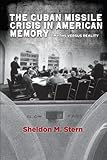He argues convincingly that Thirteen Days perpetuated a number of (largely RFK-serving) myths about the crisis that are readily disprovable by listening to the tapes JFK made of ExComm meetings. These were only available to the public within the last decade or so.
TL;DR: RFK was far more hawkish and pro-air strikes/invasion than he later portrayed himself. There was no brilliant gambit to "accept" Khrushchev's earlier offer in place of his later one: The trade of the Jupiter missiles in Turkey was viewed as an acceptable way out by JFK essentially as soon as it was proposed. President Kennedy actually comes off rather well, without over-committing to military engagement early in the crisis and by managing the post-blockade diplomatic dance while avoiding avenues of potential escalation.
[1] http://www.amazon.com/Cuban-Missile-Crisis-American-Memory/d...


Two earlier books by the author:
http://www.amazon.com/Week-World-Stood-Still-Stanford/dp/080...
http://www.amazon.com/Averting-Final-Failure-Meetings-Stanfo...
Some of the source material is available here:
http://millercenter.org/presidentialrecordings/kennedy